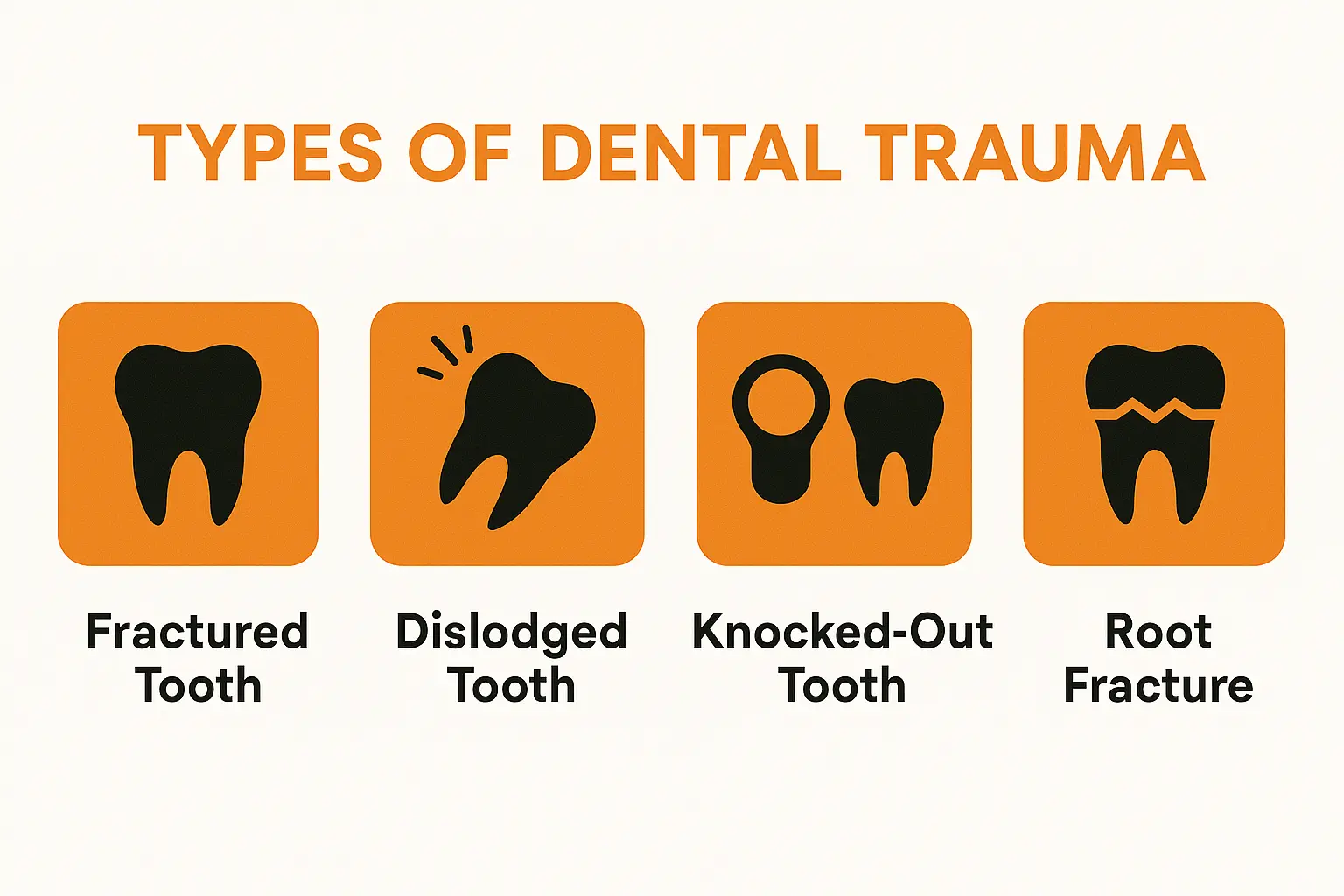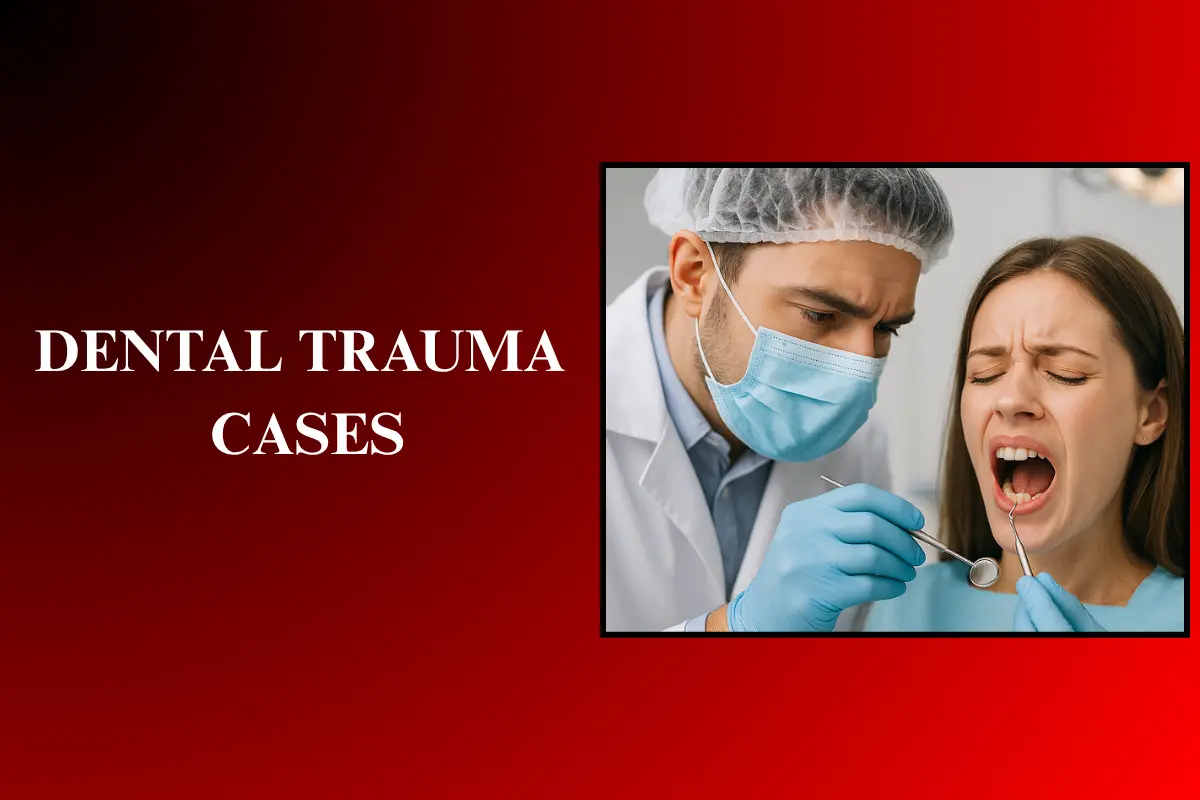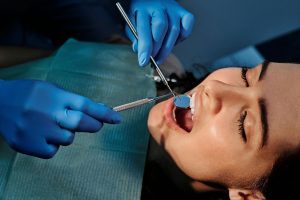Dental injuries can strike at any moment — a sudden fall, a sports mishap, or an unexpected accident. When that happens, getting immediate help is crucial. At Night and Day Emergency Dentist, we specialize in handling dental trauma cases quickly and effectively, no matter the hour.
Whether it’s a knocked-out tooth, a fractured jaw, or severe gum damage, our team is equipped to provide urgent care 7 days a week — because dental emergencies don’t stick to office hours.
Types of Dental Trauma Cases:

-
Chipped or Fractured Teeth
These are the most common dental injuries. They range from small enamel chips to deep cracks involving the pulp or root.
-
Dislodged (Luxated) Teeth
Teeth can be pushed sideways, out of position, or deeper into the socket. This often causes pain and loosening.
-
Knocked-Out (Avulsed) Teeth
When a tooth is completely out of its socket, it’s a true emergency. Quick action can help save the tooth.
-
Tooth Concussion
This is when a tooth has been hit but isn’t loose or broken. It may feel sore and sensitive to touch or pressure.
-
Root Fractures
These are cracks below the gum line and aren’t always visible. They usually require X-rays for diagnosis and may need specialist care.
-
Soft Tissue Injuries
Gums, lips, or tongue can get cut or bruised during trauma. These may need cleaning, stitches, or other treatment.
Dental Trauma Cases Process Step-by-Step
Step 1: Immediate Assessment and Stabilization
As soon as a patient walks into an emergency dental clinic, the priority is to evaluate the injury and prevent further damage.
What this involves:
- Thorough Examination: Dentists visually assess trauma, check for broken, loose, or missing teeth, and often take X-rays or digital scans to identify fractures and root or nerve involvement.
- Pain Management: Pain relief is immediate. Dentists use local anesthesia, prescription medications, or sedation options to help patients stay calm and comfortable.
- Stabilization Techniques: These include temporary splints for loose teeth, gauze packing for bleeding, or temporary crowns or bonding for fractured teeth — all aimed at keeping things stable until definitive treatment begins.
Step 2: Treatment Planning Tailored to the Injury
After initial stabilization, dentists create a personalized treatment plan based on the type and severity of the trauma.
Common treatments:
- Replanting Knocked-Out Teeth: If a tooth has been completely avulsed (knocked out), time is critical. If handled correctly (placed in milk or saline), dentists may attempt replantation and splinting.
- Bonding or Crowns for Fractured Teeth: Cracks and breaks are restored using composite bonding, crowns, or veneers, depending on how deep the fracture runs.
- Root Canal Therapy: If the pulp (nerve) is damaged, especially in deep fractures or after a replantation, endodontic therapy is started to save the tooth.
- Referrals to Specialists: Severe cases like jaw fractures or complex soft tissue injuries may be referred to oral surgeons, periodontists, or orthodontists.
Step 3: Long-Term Monitoring and Follow-Up Care
Healing from trauma doesn’t stop after the first visit. Emergency dentists set up a recovery plan that includes:
- Healing Monitoring: Follow-up visits ensure teeth are reattaching properly, infections aren’t developing, and the bite remains aligned.
- Managing Complications: Delayed root resorption, gum recession, or infection are possible, which is why dentists remain vigilant long after the trauma.
- Further Restorative Work: In some cases, once healing is complete, patients may need cosmetic enhancements, implants, or orthodontic corrections for full recovery.
Why Immediate Care Matters?
Ignoring dental trauma or delaying treatment can lead to:
- Infection or abscesses
- Permanent tooth loss
- Misalignment or bite issues
- Gum disease or bone loss
Emergency dentists help reduce these risks by offering fast, targeted care when it matters most. If you are having a dental emergency, visit our clinic for emergency treatment for prompt relief.
Get Immediate Dental CareNight and Day Emergency Dentist: We’re Always Here for You
Dental trauma doesn’t stick to a 9–5 schedule, and neither do we. Night and Day Emergency Dentist is open 7 days a week, including evenings and weekends.
Whether it’s a sports injury, a fall, or sudden tooth pain, our emergency team is equipped to manage your dental trauma case with compassion and precision.
FAQs
Conclusion
Dental trauma cases require urgent, expert attention to avoid permanent damage. Emergency dentists are trained to respond quickly, from managing pain and re-implanting teeth to repairing fractures and stopping bleeding. If you or a loved one suffers a traumatic dental injury, don’t wait. Get seen immediately.




